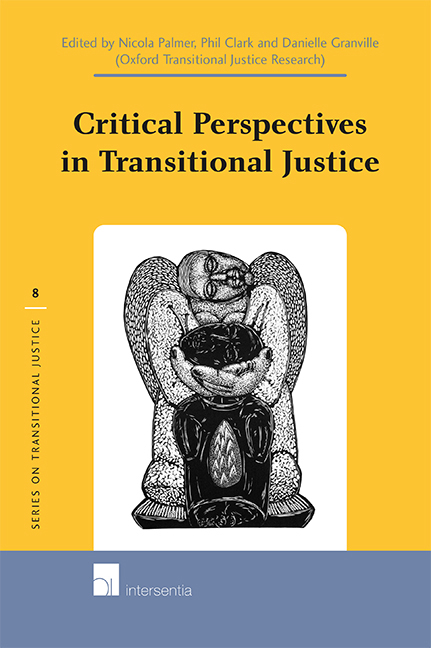Book contents
- Frontmatter
- Note
- Acknowledgements
- Contents
- Abbreviations
- Introduction
- Section 1 Critiquing Core Concepts in Transitional Justice
- Section 2 Accountability, Human Rights and the Rule of Law
- Section 3 Locality and Legitimacy
- Section 4 Memory, Ritual and Apology
- Section 5 Transitional Justice After Transition
- Contributors’ Biographies
- Series on Transitional Justice
18 - Performing Reconciliation: A Performance Approach to the Analysis of Political Apologies
Published online by Cambridge University Press: 22 December 2020
- Frontmatter
- Note
- Acknowledgements
- Contents
- Abbreviations
- Introduction
- Section 1 Critiquing Core Concepts in Transitional Justice
- Section 2 Accountability, Human Rights and the Rule of Law
- Section 3 Locality and Legitimacy
- Section 4 Memory, Ritual and Apology
- Section 5 Transitional Justice After Transition
- Contributors’ Biographies
- Series on Transitional Justice
Summary
‘Genuine apologies… may be taken as the symbolic foci of secular remedial rituals’
– Nicholas Tavuchisritual apology is insincere and therefore meaningless’
– Alison Dundes RentelnINTRODUCTION
There are many instances in which politics reveals its ritualistic character. Inauguration ceremonies for newly elected presidents or funerals for prominent political figures may be the most obvious examples of rituals in politics. The diplomatic custom to lay down wreaths on symbolic sites during state visits also reveals the ritualistic character in our international relations. But rituals can also be identified in less obvious political fields. The signing of peace treaties by politicians in front of cameras with handshakes and public embraces can be read as symbolic ritual performance, just as the literal ‘burying of the hatchet’ in ancient times. Truth and Reconciliation Commissions can be understood, among other possibilities, as repetitive ceremonies to mark transitions or even as ceremonies to hold the past present. In the fields of transitional justice and collective memory, several instruments and policies to address past atrocities bear a ritualistic character. This chapter will depict one of these instruments that has received increasing academic attention in the last years: the political apology for mass crimes.
As a ‘symbolic form of reparation’, political apologies have been hailed as a valuable reconciliatory practice in transitional processes as well as in interstate relations strained by unresolved historic crimes. Numerous criteria for ‘good’, ‘humble’ or ‘complete,’ and in the end ‘successful,’ apologies have been elaborated in recent years. This chapter will not try to supplement the academic discourse with a more vigorous and detailed specification for the evaluation of political apologies, rather it will present a different perspective on the phenomenon of political apologies. In this chapter I will read political apologies from the perspective of ritual theory. Using this approach, I will address the same question that academics have approached from other theoretical positions, of how public apologies succeed in exerting their alleged mysterious and magical force of restoring positive social relationships. Why do some public apologies succeed while others fail?
In order to answer this question this chapter will highlight the significance of the ritualistic features in collective apologies. The critical evaluation of the existing literature will demonstrate that the predominant approaches to understanding the potential power of the apology are mainly content driven, abstract and mechanistic in prospect, and neglect the ritual quality of public apologies.
- Type
- Chapter
- Information
- Critical Perspectives in Transitional Justice , pp. 347 - 368Publisher: IntersentiaPrint publication year: 2012
- 16
- Cited by



